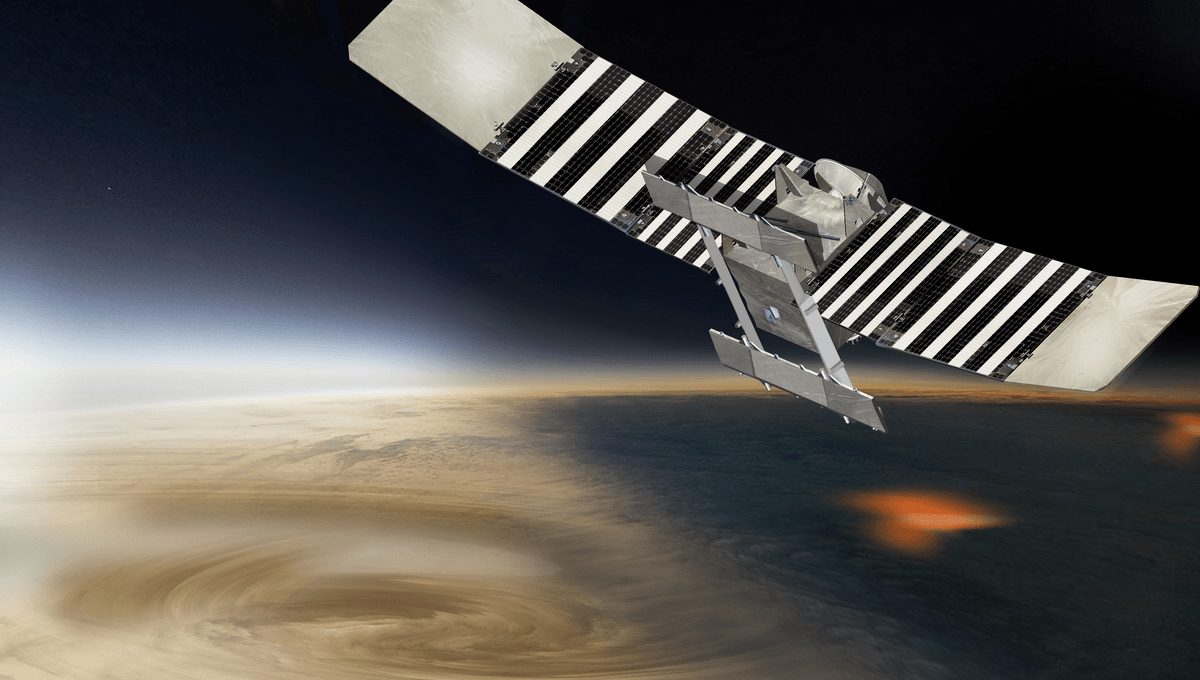
It was a dramatic week for Venus last week at the Lunar and Planetary Science Conference held in Texas. It was revealed that there are likely still active volcanos on Venus, which got people really excited about NASA’s imminent return to Earth’s hellish twin. But then it turned out that almost all the funding for its VERITAS mission had been pulled, resulting in the delay of said return to Venus.
Back in 2021, NASA announced two Discovery missions would return to Venus: DAVINCI+ (Deep Atmosphere Venus Investigation of Noble gases, Chemistry, and Imaging – the plus was dropped last year), a probe that will plunge through the planet’s dense atmosphere collecting detailed measurements, and VERITAS (Venus Emissivity, Radio Science, InSAR, Topography, and Spectroscopy), to investigate if Venus has or had plate tectonics and establish if there are still active volcanos on Venus. Launch dates were estimated for 2028-2030 with budgets of $500 million each (not huge as missions go).
However, amid a report on why the Psyche mission missed its 2022 launch, which detailed significant issues at NASA’s Jet Propulsion Laboratory (JPL) where VERITAS was being prepared, it was announced last November the VERITAS mission was to be postponed.
The report highlighted deep concerns about the management of the Psyche mission as well as issues of high stress, understaffing, inadequate scheduling, and a deficit of communication within the wider JPL. Psyche was postponed to October this year and VERITAS got a three-year pushback, so it will launch no earlier than 2031.
However, based on reports from the conference last week that the only budget currently available for the VERITAS mission is the $1.5 million budget for the science, it doesn’t look like the mission is going ahead any time soon. IFLScience has reached out to NASA and the VERITAS team for comment on the status of the mission but has not yet received a reply.
“The VERITAS delay is beyond disappointing. We were hoping to have VERITAS at Venus late this decade, returning data that would be used to calibrate measurements by ESA’s EnVision mission, due to fly to Venus in the early 2030s,” Assistant Professor Paul Byrne, from Washington University in St. Louis, told IFLScience.
“We were looking forward to getting stuck into the so-called “Decade of Venus” in the late 2020s, but now we’re going to have to wait a minimum of three years more—bearing in mind that the last US mission to Venus ended in 1994.”
This is a frustrating development for scientists who want to understand Venus as an active planet better. The last two spacecraft to successfully orbit Venus, the European Venus Express and the Japanese Akatsuki, both focused on the orbital analysis of the atmosphere. NASA’s DAVINCI, which is also set to study Venu’s atmosphere, is currently on schedule to launch at the end of the decade. But we’ll have to wait a little longer for Venus geology.
EnVision, the next European mission, would actually bridge the gap between the different studies trying to understand the relationship between geological activity and the atmosphere; to find out where Venus went wrong compared to Earth.
“NASA still hasn’t given in my opinion a satisfactory explanation for why VERITAS has been delayed so much, far beyond the one-year slip of the Psyche mission,” Byrne added.
“The VERITAS mission is an entirely collateral victim of these problems with Psyche and JPL; VERITAS had been on budget and on schedule. And zooming out even further, what NASA has done is defund and essentially stop completely a mission it had already selected for flight. I don’t know if that’s ever happened before.”
NASA’s annual budget for this year was increased by 3 percent by congress to about $24 billion, which is still less than half the increase the Biden administration asked for. In comparison, the US Defense budget for 2023 was $782 billion.
Source Link: NASA’s “Return To Venus” Mission May Have Just Become Collateral Damage